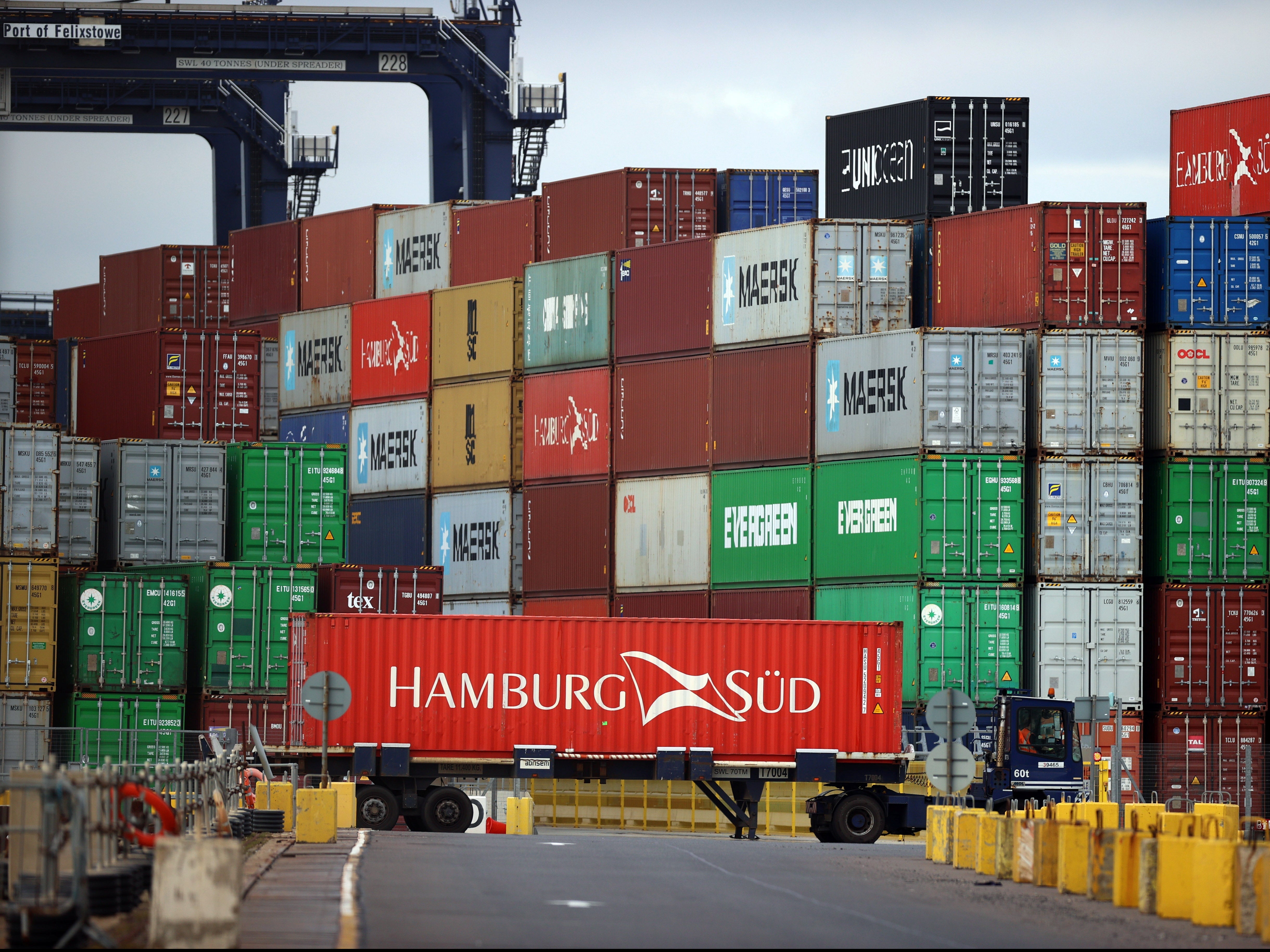The government has known about the Felixstowe problem for a year, what a shambles
The Department for Transport has apparently been ‘monitoring’ the situation since last November, says Chris Blackhurst


For a while now I’ve tried not to believe the worst of this government. I’ve seen signs but dismissed them; I’ve heard and read Dominic Cummings’s diatribes, but I’m also wary of his desire for revenge.
There was the mishandling of the pandemic in the early stages but other countries also fared badly, and we got the vaccine rollout up and running. Afghanistan was a disaster but again, we were not alone. There have been other instances of cackhandedness. Surely though, Boris and his colleagues can’t be that bad?
They can, and they are. Proof comes with the “news” this week that Felixstowe is chocker and cannot take any more containers. It was the lead story in The Times: “Ministers are being warned that Britain faces gaps on the shelves at Christmas as shipping containers carrying toys and electrical goods were diverted from the country’s biggest port yesterday because it is full. Shipping companies are directing vessels away from Felixstowe after it ran out of storage capacity. The port, on the Suffolk coast, normally handles about 36 per cent of Britain’s container imports and exports, much of it toys and furniture.”
The problem was described yesterday as a “perfect storm” caused by a shortage of lorry drivers to move the containers, restrictions at ports because of Covid, and a surge in imports. One shipping boss said: “I don’t want to sound like a grinch but there are going to be gaps on shelves this Christmas.”
Cue panic. Almost a year ago, 13 November 2020, I wrote here in TheIndependent: “Britain’s main freight ports cannot cope with existing conditions – let alone Brexit.”
A friend who imports goods from Asia had contacted me. “I don’t know if you are aware of the terrible congestion and delays at our ports. This has been caused by too many people being laid-off in the first lockdown and not all being rehired, resulting in a lack of skilled and unskilled workers.”
He wrote of a “stringent adherence to Covid-19 safety rules, which causes the whole procedure of importation to take much longer. There is also an enormous backlog. The ports that deal with Asian shipments – Felixstowe, London and Southampton – are especially hard hit”.
I went on Google. There was one article in the FT from 19 October 2020: “Delays at Felixstowe trigger calls for government intervention.” And one on Thisismoney a month earlier: “Felixstowe farce: Chaos at UK’s busiest container port spells potential crisis for small businesses as coronavirus-fuelled staff shortage creates backlog.”
While there was little in the mainstream media, in the road haulage and freight industry press and on specialist websites, there were complaints galore and considerable anger.
It was exactly as my friend said. “The main problems are the imposition of safety rules to combat the virus and a shortage of labour, which has resulted in hauliers and businesses not getting suitable time slots for collecting their containers.
“At the most convenient, traditionally the busiest, times, there are simply not enough slots to go around. This has seen firms having to incur extra port storage costs. Some have resorted to using more expensive freight air services to bypass the UK sea ports.”
This week, Maersk, the world’s biggest container shipping company, said that one of its “two really big ships” that normally call at Felixstowe each week was being diverted. Each ship, which can carry 20,000 containers, normally unloads 4,000 or so at the port.
“We had to stop operations on a ship because there was nowhere to discharge the containers,” Lars Mikael Jensen, Maersk’s head of east-west ocean network, said.
The containers are being unloaded in other ports, including Rotterdam, Antwerp and Bremerhaven, and transferred to smaller ships for transport to Britain. This is causing delays of up to a week. “It is better than having a ship outside Felixstowe for four, five, six days waiting for a berth,” Jensen said. “The problem is a Gordian knot.”
Mike Bowden, procurement manager at the global shipping group, Cory Brothers, said that it had been warning about the issue since June last year. “We have a perfect storm of problems, which has meant the port is so full of containers they cannot get them off [ships] and there is no space for the empty containers to be returned,” he said. “As an industry we are used to making things work and we need the government to sit down and listen to what is happening. I have never seen a situation like this.”
Last November, I wrote: “What’s alarming about this, as well, is that where Felixstowe is concerned, the port’s customers, the hauliers and freight users maintain the problems are not new. Bifa, the international freight forwarders’ association, says: ‘Bifa members have suffered from two years of poor service from the port, and we feel there is a need for independent intervention by the government.’”
I said then: “So far, the government has declined to act, saying that officials at the Department for Transport are monitoring the situation.”
What did The Times report this week? “Government sources said that they were monitoring the situation at Felixstowe closely.”
Cummings is right: this really is a shambles of a government.
Join our commenting forum
Join thought-provoking conversations, follow other Independent readers and see their replies
Comments
Bookmark popover
Removed from bookmarks